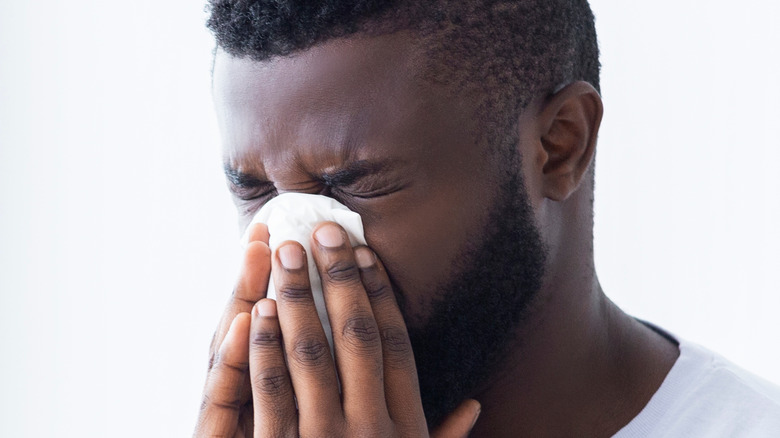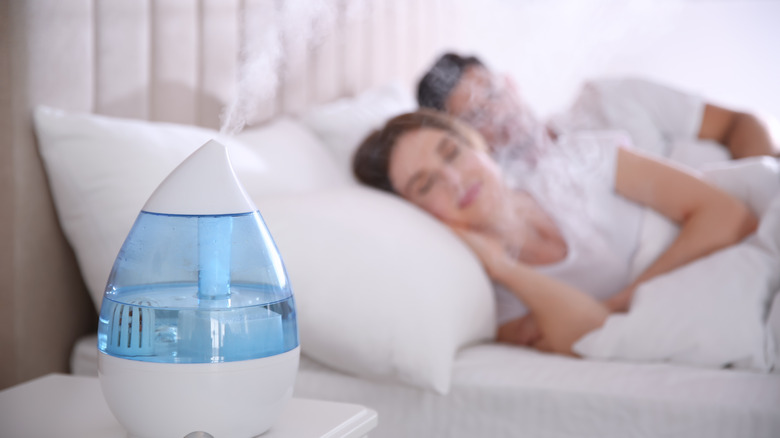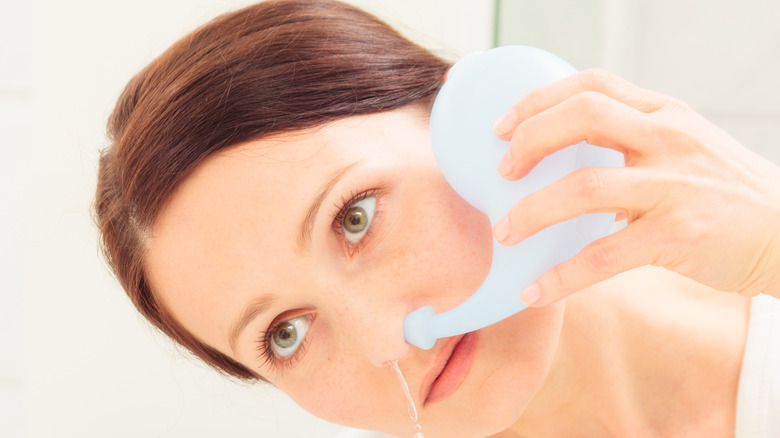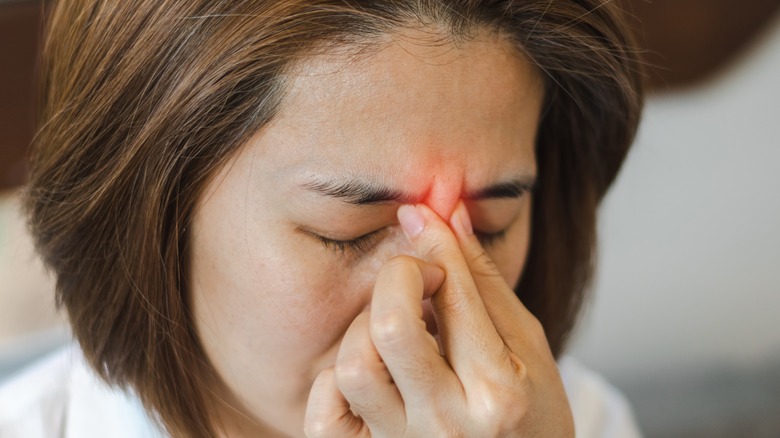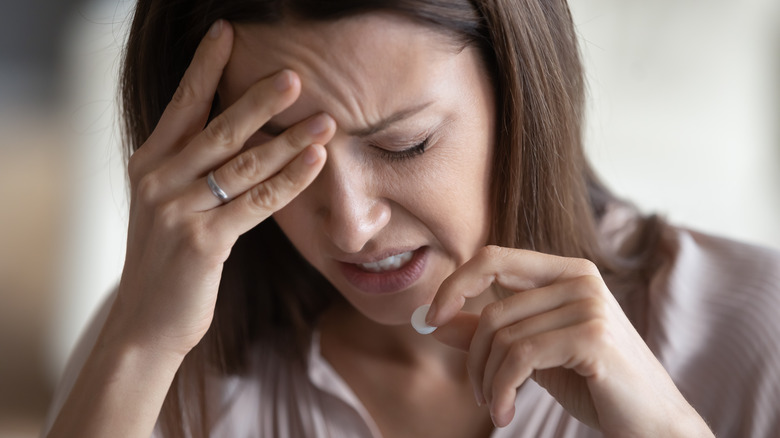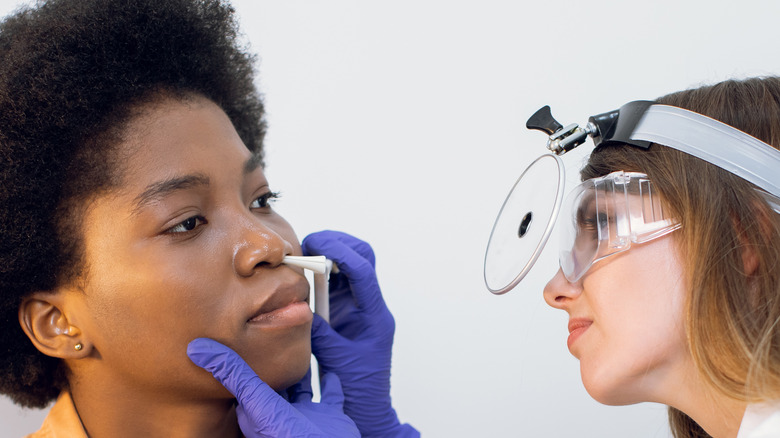Home Remedies To Try For A Sinus Infection
There's nothing quite like a sinus infection to ruin your day (or week, or even month!). Unfortunately, treatment is not always straightforward, either. Luckily, there are some pretty effective home remedies you can try if you want to relieve your symptoms on your own.
In the best case, your sinuses are healthy and just filled with air, which allows for easy breathing (via WebMD). The sinuses, which are pockets of space in the bones of your face, create mucus that helps keep out allergens and pollutants. Sometimes, though, they can become obstructed and fill with fluid, which can lead to an infection. If you have a sinus infection, you might experience a lot of facial pressure, feel congested, have a cough, develop a fever, and even feel dental pain.
Sinus infections are pretty common, affecting 35 million Americans at least once a year. The blockages that cause infections can be due to the common cold, allergies, nasal polyps, a deviated septum, or blocked drainage ducts. Most sinus infections are due to viruses — not bacteria — so they won't respond to antibiotics, according to the Centers for Disease Control and Prevention (CDC). Here's how you can help treat them at home without a prescription.
Moisture, moisture, moisture
If you start relieving symptoms at home and it's an infection caused by a virus, it should get better within a couple of weeks, according to MedicalNewsToday. One thing that might help a sinus infection is keeping your sinuses hydrated, as this can relieve blockages and pressure (via Healthline). Try using a humidifier in your bedroom at night to add moisture to the air. Breathing humid air while you sleep can keep the sinuses moist and the mucus moving. During the day, you achieve a similar effect by using a saline nasal spray, which can be found at most drugstores.
You can also breathe in steam to moisturize the sinuses. Fill a bowl with boiling water and put your face over it, with a towel draped over both your head and the bowl. Keep your face 10 inches from the water, and breathe in and out deeply through your nose for 10 minutes. You can also regularly take hot showers, inhaling through your nose as steam fills the bathroom.
Try a neti pot
While the concept of a neti pot might seem strange at first, it could be helpful for alleviating symptoms of a sinus infection (via MedicalNewsToday). The process known as nasal irrigation can be done with a neti pot, nasal bulb, or syringe.
Use a pre-made solution or make your own, following instructions from the American Academy of Allergy, Asthma, and Immunology. While breathing through your mouth, hold your head over the sink and tilt to the left, inserting the device into your right nostril. Gently squeeze about four ounces of liquid into the nose, letting it rinse out through the left nostril. Once it's all drained, tilt your head to the right and repeat the process on the other side. Make sure you clean the device after and let it dry fully to reduce the likelihood of any bacteria growing.
A 2016 study published in the Canadian Medical Association Journal found that those who used nasal irrigation experienced reduced symptoms of sinus infections and were less likely to turn to over-the-counter medications.
Warm compresses, lots of fluids, and eucalyptus oil
Applying heat directly to the face may help drain sinuses and relieve some of the pressure caused by sinus infections (via MedicalNewsToday). Get a clean face cloth, soak it in very hot water, and then squeeze it out. Place it on the areas where you feel pressure, like the forehead or nose, and let it sit for a bit. Repeat as needed to help with facial pain.
It's also helpful to drink lots of fluids to help flush the virus out. Aim for multiple glasses of water each day. Besides plain water, you can also try broth, herbal teas, or hot water with lemon. Avoid beverages like coffee and soda.
Eucalyptus oil can be another at-home tool to use for alleviating sinus infection symptoms (via Healthline). A 2009 study published in The Laryngoscope found that cineole, the main ingredient in eucalyptus oil, helped those with sinus infections recover more quickly. You can apply it to your temples or chest, or inhale it via a diffuser or boiling water (but be sure to use food-grade oils).
Use over-the-counter medications
Medications that you can easily get from the drugstore can be helpful, too, especially if you're experiencing severe symptoms (via Healthline). A pharmacist may be able to recommend one if you're not sure what will best treat your symptoms. The right kind of drug is important to help treat the cause of your infection. For example, if your infection is due to allergies, an antihistamine can help reduce inflammation caused by the allergic reaction.
A decongestant, such as pseudoephedrine (better known by the brand name Sudafed), can help with sinus pressure by narrowing the blood vessels. This allows the sinuses to drain better and can also bring down any swelling or inflammation. Note that if you have high blood pressure, you should check with your doctor before taking pseudoephedrine.
For sinus pain and headaches, try aspirin, acetaminophen (Tylenol), or ibuprofen (Advil, Motrin). Ask your pharmacist for advice on pain reliever dosage.
If these don't bring relief, turn to a doctor
Since most sinus infections are caused by viruses and will go away on their own, many doctors won't prescribe antibiotics (via Healthline). If you've been suffering for 10 days or more and nothing is helping, however, it may be worth making an appointment to determine if you have a bacterial infection. A doctor may do this by asking about your symptoms, conducting a physical exam, and possibly swabbing your nose, although this isn't always routine.
Common antibiotics for sinus infections include amoxicillin and amoxicillin-clavulanate, also known as Augmentin. They may be prescribed for as little as three days or as many as 28 days, depending on the drug. If you do take antibiotics, make sure to take them for the full duration, even if your symptoms improve.
It's also important to get plenty of rest while your body is fighting an infection. Contact your doctor if you experience a fever higher than 100.4 degrees Fahrenheit, have symptoms that aren't responding to at-home treatments or have had multiple sinus infections over the past year.

